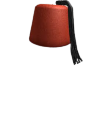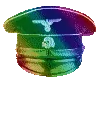Let me introduce the only distinction among the Palestinians that matters to you: Fatah vs. everyone else.
Fatah was founded by Palestinian exiles in 1959. At first it was just a pawn of the Egyptians, but when Egypt suffered the shocking humiliation of the Six Day War, it was able to wiggle its way out. With the occupation of the West Bank and Gaza many more Palestinians fled to refugee camps in the other Arab countries. Fatah managed to steal the credit for a Jordanian victory and the legend of the Palestinian fedayeen was born. It became a relatively independent organization. Of course it relied on donors from the Gulf States and Soviet bloc aid but it had enough patrons that it didn't fall into the control of any one of them. Fatah's leader Yasser Arafat tried to speak for the movement as a whole, but he could do little to restrain the other groups.
The Arabs had assumed that always assumed that Egypt would eventually roll up its sleeves and wipe out Israel once and for all. With the Egyptians humbled, there was desperate need of a new symbol of resistance.
Many Palestinians fled to refugee camps in Lebanon during the Nakba. As time passed and there was no hope of returning home in sight, the refugee camps became densely-packed slums. They were fortified and networks of secret tunnels were dug underneath, neccessary precautions since the Israelis bombed them ocasionally. All of the Palestinian groups I'm going to write about here were born in this environment: awful living conditions, no honest jobs, constant harrassment by the Israelis and the police of whatever country they were in. Many Palestinians would do just about anything for a job to feed their family, and if you weren't hired to work in the Gulf States then joining a militia was pretty much all you could do.
Nasser loved watching Esther Williams swim around. He had American diplomats bring him the reel when a new one came out. Maybe he should have been paying more attention to his air force, am I right!
Besides Fatah there was an alphabet soup of other Palestinian militias that claimed to be socialist revolutionaries, many of them doing the bidding of a certain foreign state: PFLP (Syria), PFLP-GC (Syria), as-Saiqa (Syria), Fatah Intifada (Syria), PLA (Syria) DFLP (Soviet Union), PCP (Soviet Union), ALF (Iraq), Abu Nidal's gang (Syria then Libya then Iraq). Most were splinter groups of the PFLP or Fatah that began when one subordinate commander decided he didn't like taking orders. Their foreign patrons gave them enough money to hire soldiers so they had an importance far greater than their support among the population.
PFLP fedayeen, 1969. These guys are supposed to replace Egypt?
These groups were responsible for most of the spectacular terrorist attacks seen in the West. Any time Arafat tried to negotiate, one of them would do an attack to embarrass him. (Fatah did do terrorism as well, including some of the worst cases.)
Hijacker Leila Khaled. She raised a lot of eyebrows in the West but nothing she did brought her people any closer to freedom.
1975
After being driven from Jordan in 1970 for trying to take over the country, the Palestinian leaders took up residence in Lebanon. This obviously caused a lot of consternation among Lebanese and Arafat had a hard enough time just trying to get the different groups to stop shooting each other in the refugee camp. He knew that this was their last chance. If they were driven from Lebanon they would have nowhere to turn. Arafat tried to keep the situation from completely spiraling out of control, but the other factions would not stop provoking the natives. The location of the camps around Beirut made it virtually impossible to avoid trouble, as they had to go through densely populated parts of the city to travel between them. Arafat's money, prestige, and relatively strong and cohesive military force gave him great influence in Lebanon's politics as well as Palestine's but there was no way to tamp down the lid forever.
Speaking of terrorism, Day of the Jackal came out a couple years earlier. A journo found a copy of the original Fredrick Forsyth novel in what he believed to be the luggage of a notorious Palestinian terrorist. This is where the nickname Carlos the Jackal comes from. Great movie btw.
Arafat commanded the respect of the bulk of the population in the refugee camps. There were three around Beirut and one just outside of each major city. Fatah had a large force of militia with little or no training, but it also had an elite force of men who were trained up to the standards of real soldiers. Some had been trained in the Jordanian Army before 1970 or the Soviet bloc. This little army would amount to very little in a big conventional war, but there were few men in the warring Lebanese factions who were on their level.
The Hotels War pitted local Sunnis, Lebanese Army defectors, and Palestinians against the Lebanese Forces.
The radical groups had their own militias but they were poorly trained and disciplined. They hired anyone they could, even many Arabs from other countries. In a war they might be expected to defend their own neighborhoods but not much more. Airline passengers were the only target they could outfight. They were especially resentful of Fatah at this time because Arafat had just begun opening up the idea of negotiations with Israel.
1980
It was the height of power of the Palestinian refugees. The 1975-1976 war had been hard on the Palestinians, with the entire Tal el-Zaatar refugee camp razed. They were now tightly intwined with the local Sunnis and their miltia Mourabitoun. But while Arafat hadn't managed to keep the peace, he at least kept the Syrians from taking complete control. They stayed out of a large area in the south of the country, including the border. Lebanon's army had disintegrated and couldn't stop them. So the Palestinians took over this area, soon known as Fatahland. They now had direct access to the border. Their artillery shelled Israeli towns sporadically, trying not to be caught in the enemy airstrikes that often followed. Enterprising terrorists also discovered a new way to attack. They could get around the border on inflatable boats, land on the beach, and find some Israeli target to attack. Of course it was always a bus or a school, but hey, at this phase of the revolution you can't expect us to take on soldiers.
The Soviet 130mm gun. Designed for long range, it can hit targets 27.5km away. This gave its operators plenty of room to hide the massive gun in.
1985
The Palestinian refugees were now virtually powerless in Lebanon. When they surrendered Beirut, they were scattered into distant exile in several Arab countries. The leaders were settled in Tunis, 2000km away from the enemy. To add insult to injury, the Israeli commandos occasionally made it that entire distance to pop up in Tunis and kill one of them. Fatah and its supporters had always imagined that it would build itself up until someday it could fight Israel in a final war of liberation, but now it was clear that trying to attack Israel from the outside was a dead end. From now on, the Palestinian cause would be taken up in the occupied West Bank and Gaza.
An attempt was made to capture Tripoli and use it as a base to bring Fatah back to Lebanon. Rather than side with Arab nationalists and Communists like he had in the past, their allies now were Islamic fundamentalists, a sign of how the old causes were dying out in favor of the new jihad. They were opposed by Syrian troops as well as several thousand Palestinians who had defected over the years to support Syria instead. The battle was over quickly and Arafat sent back into exile in a farcical repeat of the evacuation from Beirut.
1990
Some Palestinians loyal to Arafat still remained in Lebanon and they were still taking part in fighting. Now they were only helping the stronger forces like Hezbollah. They were able to hold onto their refugee camps for now, but they were no longer an independent player in Lebanon. All of the Palestinian movement's attention and energy was now focused on the occupied territories. The fantasy of fedayeen coming from the refugee camps to liberate the country was over. Arafat still commanded enough respect that he could represent the Palestinians in the new peace process that was developing.
The crew of the Enterprise was in some pretty serious trouble too! Part I of "Best of Both Worlds", the Borg invasion of Earth, aired in 1990.
Epilogue
In 2007 a splinter group of a splinter group of Fatah in the Naher al-Barid refugee camp outside Tripoli declared their allegiance to al-Qaeda. They beheaded several soldiers in a cowardly sneak attack. Since the army is the only institution in the country that unites all sects, this pissed off everyone. The camp was eventually flattened by artillery and bulldozers after a brutal siege, just like during the Civil War. I guess it was kids trying too hard to be cool like their dads.
Ain el-Hilweh outside Sidon remains. If you want to experience Escape From New York in real life, this is as close as you're going to get. Lebanese police and security forces are not allowed in. The local population settles everything themselves. This often means gang-style shootings but can escalate quite a bit. Stray RPGs have been known to land in Sidon. These days the battles are between Fatah and Islamists. Now they're fighting over buildings, not countries.
This one was pretty good too. I mean it's not like a classic or something but it's enjoyable.


















Jump in the discussion.
No email address required.
What are your thoughts on Space Palestine?
Jump in the discussion.
No email address required.
It's the first place where they won't piss off their neighbors. Give them a planet and let them do their own thing for a while and I'm sure they'll mellow out.
Jump in the discussion.
No email address required.
No I meant the Bajorans
Jump in the discussion.
No email address required.
The Bajorans were intended to be represent the Space Jews, AFAIK, but I always hated that they were reduced to impotent femboys in ST:DS9.
Jump in the discussion.
No email address required.
When they're first introduced in "Ensign Ro" they're very Palestinian. They're scattered in refugee camps, they're trying to fight their oppressors but aren't very good at it, they tend to be buttholes, they ruin their opportunities to get help from outside powers by being hostile for no good reason.
Jump in the discussion.
No email address required.
More options
Context
More like potent tomboys
Jump in the discussion.
No email address required.
The Major is notable for having left behind most of the lifestyle and norms of her people.
The real tomboy is Dax when inhabiting a female body.
Jump in the discussion.
No email address required.
More options
Context
More options
Context
More options
Context
Ensign Ro I love to death. She was exactly the character that the show needed. Not some renegade who plays by their own rules but wins every time. Someone who's got potential but is kind of frickup and needs to learn how to be a team player. She must have been one of the first things they did when Roddenberry died and they could have conflict among the crew.
I liked in "Parallels" when they briefly mentioned that in one universe, the Bajorans had taken over the Cardassian Empire and now they were the aggressors. Totally something that would happen in those circumstances.
Last time I watched DS9 I actually found I liked the political/religious episodes, at least in the first half of it or so. There was a degree of subtlety there since you didn't have to wrap every story up and fly away at the end of the episode. Those plot lines really played to DS9's strengths as a show that's still episodic but you'll run into the same people again.
All the nonsense with the fricking ghosts and shit toward the end I thought was really cheap and stupid. It felt like the whole purpose of the Bajoran religion was to force Dukat to be really really evil because that's what the writers wanted.
Jump in the discussion.
No email address required.
I get the feeling that at least some of the writers were frustrated/upset that Dukat became such a fan favorite. My man was just too likeable to be an absolute villain.
Jump in the discussion.
No email address required.
Yeah, they said that openly. That they had originally planned for Dukat to be Hitler, but they suddenly realized toward the end that he was redeeming himself. So instead of following this very interesting arc for his character, they decided to abruptly have him do a bunch of evil stuff to remind you he's bad. I find that offensive because aren't we supposed to be trying to better ourselves? Isn't that what life is all about? If you write people off as incorrigibly evil because they committed a bunch of crimes, then why in the heck does it take 7 seasons to finally kill him?
It's a real shame too because they let other secondary characters grow into being more interesting than the main cast: Garak, Weyoun, Martok, BIPOC, even frickin' Damar. The writers never got in their way.
Jump in the discussion.
No email address required.
More options
Context
More options
Context
You sat down and wrote all this shit. You could have done so many other things with your life. What happened to your life that made you decide writing novels of bullshit here was the best option?
Jump in the discussion.
No email address required.
Longie, you haven't even seen me get started on Star Trek.
Jump in the discussion.
No email address required.
I've read every word so far comrade, just be sure to put in plenty of for us when you start going ham on startrek
for us when you start going ham on startrek
Jump in the discussion.
No email address required.
More options
Context
More options
Context
More options
Context
More options
Context
More options
Context
More options
Context
More options
Context